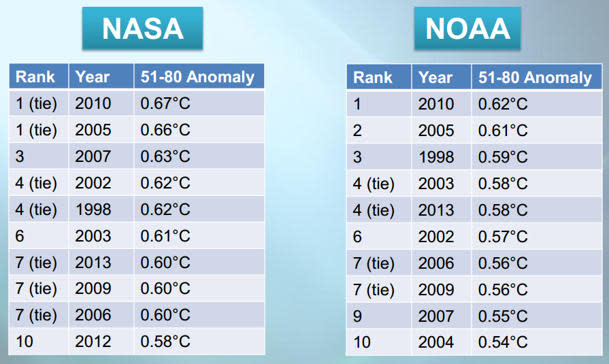 Science and Weather
Science and WeatherDespite current Arctic chills, 2013 was 4th warmest year on record
It may be cold across most of North America this month — in some places colder than they've seen in decades — but the figures from last year are in, and 2013 has come out as the fourth hottest year since records began back in 1880.
Gathering temperature data from around the globe, both over land and over the oceans, NOAA — the US National Oceanic and Atmospheric Administration — and NASA have produced an overall picture of the weather and changing climate from last year. Compared to previous years, 2013 ties 2003 for fourth hottest year on record according to NOAA, and it ties 2006 and 2009 for seventh place according to NASA.
[ Related: No relief for Earth's warming trend in 2013, studies find ]
NOAA and NASA rankings differ based on the fact that they use slightly different data sets to figure out the global average temperature. Think of each being a 'check' of the other. However, having a different ranking between the lists isn't difficult, since the temperature differences between these top ten warmest years are razor thin.
"The difference between the joint fourth place and the joint seventh place is within 0.02 C of a degree," said Gavin Schmidt, deputy director of NASA's Goddard Institute for Space Studies, according to CBC News.
So, we're talking about very tiny values jostling these years around on the list.
The trend is the part to really take away from all of this. 1998 still ranks high on the list, since it was an extreme year, dominated by a very powerful El Nino, and Environment Canada has a whole grocery-list of extreme events that took place here in Canada. However, every other year that populates the list of top ten hottest years is from the past 13 years.
Also, the world is not only getting warmer, but it's getting warmer faster. According to NOAA, "[t]he global annual temperature has increased at an average rate of 0.06°C per decade since 1880 and at an average rate of 0.16°C per decade since 1970."
NOAA also produced a map showing significant climate anomalies and events over the past year (click here), which includes the flooding in southern Alberta in June, but many of the events are about unusually hot or dry conditions. California had its driest year on record, Russia experienced its sixth hottest year and warmest November and December on record, and Australia had its hottest year ever.
[ More Geekquinox: Major blizzard shuts down most of Atlantic Canada ]
The frigid weather through North America over the past month has certainly propped-up the claims of those who deny that global warming climate change are happening and that they're being caused by us and our dependence on fossil fuels. However, climate change affects the entire world. While it's cold here in North America, where it's the middle of winter, Australia is suffering through a summer heat wave right now. According to the Sydney Morning Herald, Melbourne suffered through four consecutive days with temperatures of 41°C or hotter. Time.com pointed out that Adelaide was the hottest city in the world last Thursday with the temperature reaching 44.2°C.
Even the cold we're experiencing possibly has its root cause in global warming. These shots of cold that are being blamed on the polar vortex are definitely weather, as opposed to climate. However, there's good reason to consider that the warming we've seen in the Arctic may be contributing to a weak polar vortex, which allows the jet stream to dip far south, dragging these Arctic chills along with it. Why haven't we been having these cold shots every year? You can probably blame La Niña for that, since that weather pattern had a strong influence over conditions here the past few years (thus the more mild winters).
Bottom line: The world's warming trend continues, and a month or so of frigid cold during the winter doesn't 'disprove' climate change, especially when other areas of the world are suffering through 'horrifying' heatwaves.
(Images courtesy: NASA)
Geek out with the latest in science and weather.
Follow @ygeekquinox on Twitter!




